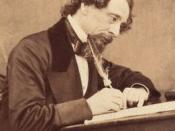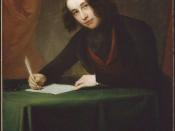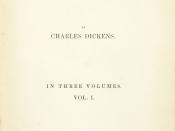Charles Dickens' Great Expectations is narrated by its young hero, orphan Philip Pirrip, known as Pip, living with his older sister and her husband, blacksmith Joe Gargery, in the Kent marshes. Young Pip lived a life similar to other orphans yet confronted a vast range of improbable incidents, such as helping a fugitive convict. Pip's background, opportunities offered to him, and familial life make his experience uncharacteristic compared to others in a similar position.
From the first page of the novel, Pip enlightens the reader "I never saw my father or my mother ... and infant children of the aforesaid, were also dead and buried.". This is a very precise portrayal of 19th century Britain as the deficiency of nutritious food, hygiene and sanitation resulted in a low life expectancy and a high infant mortality rate. It was well documented that in industrial towns the average age of death was twenty-six years, which means that as a child grew older, it was expected for them to lose one or more siblings as well as one or both parents, just like Pip.
Many women died due to the fact that childbirth was attributable to infectious agents transmitted by unwashed hands. As Mrs Pirrip gave birth to seven children it is very likely that her appearance was as how Pip imagined - "freckled and sickly,". Many children died young, struggling with harsh living conditions, and were poorly nourished and prone to infectious and deficiency diseases. Even though Pip describes himself as "undersized...and not strong." he appears to be reasonably healthy, unlike most orphans. However, Mr Wopsle's great-aunt is introduced as a living grandmother, which was highly unlikely in Victorian Britain due to poor hygiene and especially the dooming consequence of having a child, as she did. Dickens includes a very old...


